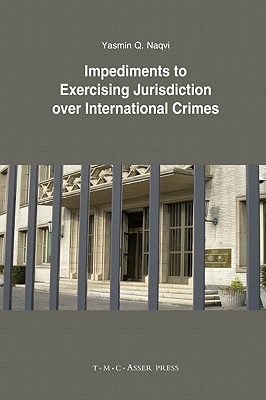
- We will send in 10–14 business days.
- Author: Yasmin Q Naqvi
- Publisher: T.M.C. Asser Press
- Year: 2010
- Pages: 400
- ISBN-10: 9067043206
- ISBN-13: 9789067043205
- Format: 17 x 24.6 x 2.8 cm, hardcover
- Language: English
- SAVE -10% with code: EXTRA
Impediments to Exercising Jurisdiction Over International Crimes (e-book) (used book) | bookbook.eu
Reviews
Description
The assumption is growing that legal impediments to the exercise of jurisdiction are invalid in the face of the imperative to prosecute international crimes. This analysis of seven principal impediments comparatively analyses each from the perspective of their historical origins, the policy contexts justifying them and the legal arguments used by courts and commentators to either uphold the barrier to prosecution or to reject its application so that prosecution remains unhindered. The seven impediments are: (1) Amnesties; (2) Pardons; (3) Statutes of Limitation; (4) Abuse of Process; (5) Immunities; (6) Ne bis in idem (double jeopardy); and (7) Male captus bene detentus (wrongly captured, properly detained). Each chapter contains a theoretical evaluation of each impediment, as well as a discussion of relevant case-law from world-wide domestic and international jurisdictions.
EXTRA 10 % discount with code: EXTRA
The promotion ends in 19d.21:04:53
The discount code is valid when purchasing from 10 €. Discounts do not stack.
- Author: Yasmin Q Naqvi
- Publisher: T.M.C. Asser Press
- Year: 2010
- Pages: 400
- ISBN-10: 9067043206
- ISBN-13: 9789067043205
- Format: 17 x 24.6 x 2.8 cm, hardcover
- Language: English English
The assumption is growing that legal impediments to the exercise of jurisdiction are invalid in the face of the imperative to prosecute international crimes. This analysis of seven principal impediments comparatively analyses each from the perspective of their historical origins, the policy contexts justifying them and the legal arguments used by courts and commentators to either uphold the barrier to prosecution or to reject its application so that prosecution remains unhindered. The seven impediments are: (1) Amnesties; (2) Pardons; (3) Statutes of Limitation; (4) Abuse of Process; (5) Immunities; (6) Ne bis in idem (double jeopardy); and (7) Male captus bene detentus (wrongly captured, properly detained). Each chapter contains a theoretical evaluation of each impediment, as well as a discussion of relevant case-law from world-wide domestic and international jurisdictions.


Reviews